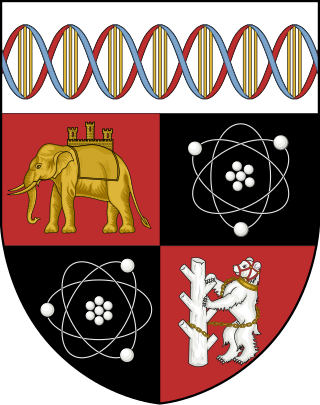
The University of Warwick is a public research university on the outskirts of Coventry between the West Midlands and Warwickshire, England. The university was founded in 1965 as part of a government initiative to expand higher education. The Warwick Business School was established in 1967, the Warwick Law School in 1968, Warwick Manufacturing Group (WMG) in 1980, and Warwick Medical School in 2000. Warwick incorporated Coventry College of Education in 1979 and Horticulture Research International in 2004.
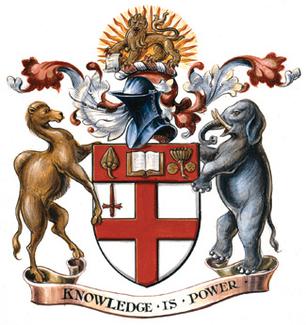
The School of Oriental and African Studies is a public research university in London, England, and a member institution of the federal University of London. Founded in 1916, SOAS is located in the Bloomsbury area of central London.
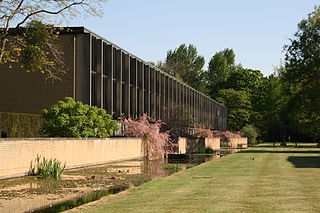
St Catherine's College is one of the constituent colleges of the University of Oxford. In 1974, it was also one of the first men's colleges to admit women. It has 528 undergraduate students, 385 graduate students and 37 visiting students as of December 2020, making it one of the largest colleges in either Oxford or Cambridge.

Goldsmiths, University of London, legally the Goldsmiths' College, is a constituent research university of the University of London. It was originally founded in 1891 as The Goldsmiths' Technical and Recreative Institute by the Worshipful Company of Goldsmiths in New Cross, London. It was renamed Goldsmiths' College after being acquired by the University of London in 1904, and specialises in the arts, design, computing, humanities and social sciences. The main building on campus, known as the Richard Hoggart Building, was originally opened in 1844 and is the site of the former Royal Naval School.

The University of Kent is a semi-collegiate public research university based in Kent, United Kingdom. The university was granted its royal charter on 4 January 1965 and the following year Princess Marina, Duchess of Kent, was formally installed as the first Chancellor.

The Hong Kong University of Science and Technology (HKUST) is a public research university in Sai Kung District, New Territories, Hong Kong. Founded in 1991, it was the territory's third institution to be granted university status, and the first university without any precursory existence upon its formation. It occupies a 60-hectare (150-acre) seaside site in Tai Po Tsai, Clear Water Bay Peninsula, and has established a satellite campus in Guangzhou, Guangdong, China.

This is a list of halls of residence on the various campuses of the University of Nottingham in Nottingham, England.
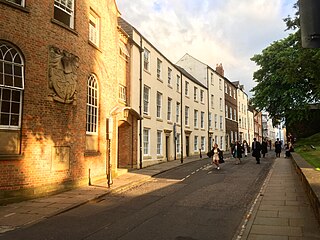
St Chad's College is one of the recognised colleges of Durham University. Founded in 1904 as St Chad’s Hall for the training of Church of England clergy, the college ceased theological training in 1971 and now accommodates students studying the full range of Durham University courses. Its members are termed "Chadsians" and is the smallest Durham college by number of undergraduates, but has extensive college library facilities and among the highest level of academic performance.
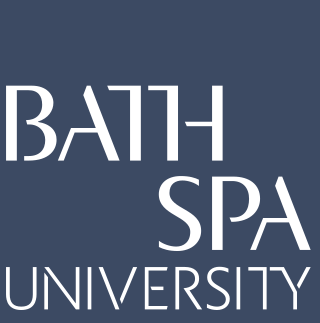
Bath Spa University is a public university in Bath, England, with its main campus at Newton Park, about 3+1⁄2 miles (5.6 km) west of the centre of the city. The university has other campuses in the city of Bath, and one at Corsham Court in Wiltshire.

Van Mildert College is one of the 17 constituent colleges of Durham University. The college was founded in 1965 and takes its name from William Van Mildert, the last Prince-Bishop to rule the County Palatine of Durham and a leading figure in the university's foundation. Originally an all-male college, Van Mildert admitted female undergraduates for the first time in 1972, making it the first Durham college to become mixed.

The University of Exeter offers approximately 6,500 purpose-built student bed spaces for its students. The majority of its residences are located on campus, although 30% of self-catered accommodations are located off-campus.
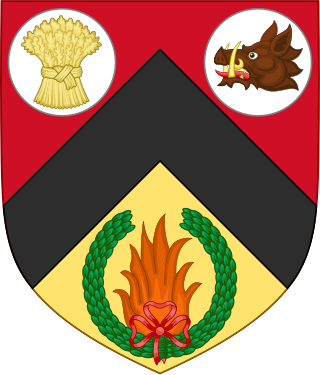
University College Birmingham is a university in Birmingham, England. It was awarded full university status in 2012 along with Newman University. It is not a member of Universities UK. The university was awarded 'University of the Year' in the 2022 WhatUni Student Choice Awards, as well as coming first in the 'Student Support' category.

Trinity University College was a Church University College in Carmarthen, Wales.

Bishop Grosseteste University (BGU) is one of two public universities in the city of Lincoln, England. BGU was established as a teacher training college for the Diocese of Lincoln in 1862. It gained taught degree awarding powers in 2012, applied for full university status, and was granted on 3 December 2012. It has around 2,300 full-time students enrolled on a variety of programmes and courses.
Colleges within universities in the United Kingdom can be divided into two broad categories: those in federal universities such as the University of London, which are primarily teaching institutions joined in a federation, and residential colleges in universities following the traditional collegiate pattern of Oxford and Cambridge, which may have academic responsibilities but are primarily residential and social. The legal status of colleges varies widely, both with regard to their corporate status and their status as educational bodies. London colleges are all considered 'recognised bodies' with the power to confer University of London degrees and, in many cases, their own degrees. Colleges of Oxford, Cambridge, Durham and the University of the Highlands and Islands (UHI) are 'listed bodies', as "bodies that appear to the Secretary of State to be constituent colleges, schools, halls or other institutions of a university". Colleges of the plate glass universities of Kent, Lancaster and York, along with those of the University of Roehampton and the University of the Arts London do not have this legal recognition. Colleges of Oxford, Cambridge, London, and UHI, and the "recognised colleges" and "licensed halls" of Durham, are separate corporations, while the colleges of other universities, the "maintained colleges" of Durham, and the "societies of the university" at Oxford are parts of their parent universities and do not have independent corporate existence.
The Institute of Advanced Legal Studies (IALS) is a member institute of the School of Advanced Study, University of London. Founded in 1947, it is a national academic centre of excellence, serving the legal community and universities across the United Kingdom and the world through legal scholarship, facilities, and its comparative law library.

The University of Wales Trinity Saint David is a multi-campus university with three main campuses in South West Wales, in Carmarthen, Lampeter and Swansea, a fourth campus in London, England, and learning centres in Cardiff, Wales, and Birmingham, England.
There are eleven residential colleges of the University of Queensland.

University Centre Shrewsbury was a Higher Education Institution in Shrewsbury, Shropshire. As of September 2024 it is permanently closed.

Turing College is a residential college at the University of Kent, established in 2014 as the university's sixth college. It was named after Alan Turing, a British mathematician and codebreaker, known for his foundational contributions to computer science and his pivotal role in breaking German codes during World War II at Bletchley Park.

















